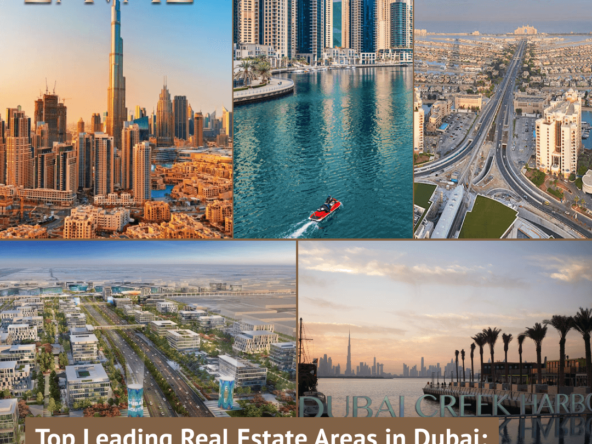Dubai’s real estate market is bustling and attractive, pulling in investors, homebuyers, and builders from all over. Looking ahead to 2025, Dubai’s real estate scene is expected to shine even brighter with many new opportunities and some challenges. Thanks to its top-notch roads and buildings, smart rules, and fame as a global spot for work and fun, Dubai remains a favourite place for investing in property. Let’s look at the main things shaping the future of real estate market in Dubai as 2025 approaches, the trends to watch out for, and the exciting investment options that await.
What’s Next for the Real Estate Market with PropTech
PropTech, short for property technology, is making significant changes in the real estate world, making things more straightforward for everyone. Looking ahead to 2025, PropTech is set to become even more critical in real estate.
A significant update in the real estate sector is the integration of artificial intelligence (AI) and machine learning. These technologies are revolutionizing how we buy off-plan property by analyzing vast amounts of data to forecast property prices and offer personalized recommendations to buyers and investors. Additionally, AI-driven chatbots and virtual assistants are gaining popularity, providing instant assistance and streamlining the process of finding and purchasing properties.
Virtual reality (VR) and augmented reality (AR) reshape how we view properties. Buyers can now take virtual tours of properties from their own homes, avoiding the need to travel. This saves time and lets people from different places quickly check out properties, expanding the market.
Blockchain technology is improving safety and transparency in transactions. It reduces fraud risks and makes buying and selling properties smoother. Smart contracts automate agreements using code, speeding up transactions.
These updates pave the way for a promising future in the real estate market, improving how we buy, sell, and manage properties.
Embracing Green Building for a Better Future
Green living is now a big deal for everyone, not just a few. As people become more concerned about the environment, real estate is getting serious about building in good ways for the planet.
Buildings that use less energy are really in demand. Features like solar panels, windows that keep heat in, and systems that help manage how much energy a house uses are becoming common in new places. These additions help the Earth and also help homeowners and renters save on their energy bills.
Green certifications like LEED (Leadership in Energy and Environmental Design) or BREEAM (Building Research Establishment Environmental Assessment Method) are getting more popular. Buildings with these stamps of approval are more appealing because they show a genuine effort to be eco-friendly and are built to high standards.
Town and city planning is also leaning towards green ideas. More developments mix living spaces with shops and offices and have many walking paths and green areas. This means less car need and more enjoyable, healthy places to live.
Furthermore, there is a growing trend to reuse and repurpose existing buildings instead of tearing them down, which saves materials and reduces waste. This approach not only preserves the character of neighbourhoods but also minimizes the carbon footprint associated with new constructions. People increasingly realize that taking care of our buildings and cities this way leads to a healthier planet and happier lives.
The Future of Remote Work and Its Impact on Real Estate
As we move into 2025 and beyond, we’re changing towards hybrid work models, where people work partly at home and partly at the office. This is making companies rethink their need for office space. They’re now looking for smaller, flexible office spaces that can change to fit different team sizes and work styles.
This change also affects where people choose to live. With the freedom to work from anywhere, many move from busy cities to quieter suburban or rural areas for a better lifestyle. This has increased the demand for bigger homes with spaces dedicated to work and lovely outdoor areas.
Another interesting development is the rise of co-living spaces. These offer private areas to live in with shared spaces for meeting and working together. They are popular among remote workers who want to feel part of a community. These spaces often have fast internet, coworking areas, and other features that help with working from home.
All these trends are shaping the future of Dubai real estate and the broader future of real estate by changing how and where people choose to live and work.
The Rise of Crowdfunding in Real Estate
Real estate crowdfunding makes property investment with Laval Properties accessible to more people, letting them invest in real estate projects with just a little money. This trend is expected to grow in 2025 and beyond, opening new opportunities for investors and developers.
Crowdfunding platforms let investors gather to put money into real estate projects, from houses and apartments to commercial spaces. This makes it possible for more people to invest in real estate, even those who don’t have a lot of money to start with.
For developers, crowdfunding is a flexible and accessible alternative to traditional financing from banks. It also helps developers see the interest in their projects and creates a community of investors who care about the project’s success.
As more people get into real estate crowdfunding, laws and rules are being updated to keep everything clear and safe for investors. Platforms are doing more checks and sharing information about the investments to build trust and show they are reliable.
Furthermore, as this way of investing grows, it’s also helping to fund projects that might not get money otherwise. This includes eco-friendly buildings and affordable housing. By supporting these projects, investors make money and contribute to better communities and a healthier environment. This shows how crowdfunding changes our investment in real estate and the projects built.
Smart Home Tech: Changing the Future of Real Estate
Smart home technology is becoming a big part of our lives, making our lives easier, safer, and cheaper. As we look to 2025 and beyond, homes with innovative features are becoming more popular.
Smart thermostats, lights, and security cameras can be controlled anywhere using smartphones or voice commands. These gadgets make life easier and can help save money on energy bills by using energy smarter.
Voice-activated devices such as Amazon Alexa and Google Home are turning into the main controls for smart homes. They let you control several devices just by talking to them. As this technology improves, all the smart devices in a house will work together more smoothly.
People looking to buy homes are interested in places with smart tech. Builders and developers are adding these features to new homes to meet this interest. Also, increasingly older homes are being updated with savvy tech, making them more appealing to people who like the latest technology.
Moving forward, smart home technology will be a big part of the future of real estate. It’s not just about making homes more comfortable or easier to handle but also about making them worth more and more attractive in a market that wants modern, efficient living spaces. This move toward more innovative homes shows how technology is merging with living spaces to meet the changing needs of homeowners.
How Changing Populations Shape the Future of Real Estate
Changes in who lives where and what they need are significant factors in the future of real estate. Understanding what different age groups want is important because it helps us guess where the housing market is going.
Millennials, who now make up the biggest group in the workforce, are starting to buy homes. They like places that are easy to get to, are suitable for the environment, and have the latest tech. They often choose homes close to public transport, cafes, and places to have fun. Many millennials also prefer to rent because it gives them the freedom to move if they want to.
Generation Z, the group behind millennials, is just starting to think about buying homes. They know much about technology and want bright, green, affordable homes. People who build houses and sell real estate need to consider what Gen Z wants as they become more critical in the market.
Baby Boomers, who are getting older and often retiring, are looking to move into smaller homes or places that fit their needs better as they age. They like homes that are easy to care for, near medical care, and near things to do. There’s a growing need for places for older adults because Baby Boomers want homes that make their lives easier and healthier.
These shifts in what different age groups need are changing the future of real estate, including the future of Dubai real estate. Real estate experts must keep up with these changes to ensure they have the right kinds of homes available.
Why Cities Keep Growing
Even with more people working from home and moving to the suburbs, cities are still growing. People come to cities for jobs, fun places to visit, and the exciting life they offer.
In 2024 and beyond, cities plan to be more livable, sustainable, and challenging. There’s a big push for mixed-use developments, which mix homes, shops, and places to relax all in one area. These projects make walking around easy, reduce travel time, and help build a feeling of community.
Improving transport is also a big part of city planning. More public transport, bike paths, and walkable streets are key for the future of cities. Developers are focusing on building lively, mixed-use areas around transit stations to make getting around easier and life more convenient.
How the Economy Shapes the Future of Real Estate
Economic conditions play a significant role in shaping the real estate market in 2025 and beyond. Interest rates, inflation, and economic growth affect how many people want to buy homes and how much they’re willing to pay.
Interest rates play a crucial role in determining the affordability of mortgages. When interest rates are low, it becomes more cost-effective to borrow money, which encourages more people to buy apartments in Dubai. Conversely, as interest rates rise, the home purchase costs increase and fewer people may be interested in buying.
Inflation can also change the real estate market. When the cost of building materials goes up, so do property prices, which can make homes more challenging to afford. However, real estate is often a good protection against inflation because property values increase over time. During inflation, investors usually consider real estate a safe and growing investment.
The overall health of the economy and job market is also crucial. A strong economy with many job opportunities can make people feel more secure and willing to buy homes. However, if the economy slows down, people might be more cautious about buying, which can cool down the real estate market.
These economic factors are key to understanding the future of real estate, as they influence both the demand for homes and the prices people are willing to pay.
Conclusion
The future of real estate looks to be influenced by several important factors as we head into 2025 and the years that follow. Advances in technology, efforts to be more sustainable, changes in who is buying homes, shifts in the economy, and new customer wants and needs all play a role. Understanding these trends will be essential for anyone looking to buy, sell, invest, or work in real estate. Keeping up with these changes can help you make better decisions in an ever-evolving market.



